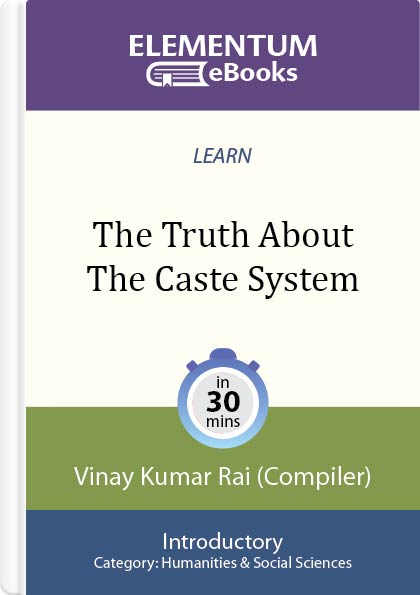
$4
The objectives of this eBook are to concisely list in one place all credible information (ie information from experts, serious researchers, and British-Raj-era colonialists and missionaries) on caste and the caste system that I have come across.
——————
There are two main parts: the Summary and the Full Compilation. The Full Compilation answers the following questions (‘SD’ means Sanatan Dharma, the true name of Hinduism; click on a line to go directly to that section):
a. Where Is The Concept Of ‘Caste’ Mentioned In The Literature Of Sanatan Dharma? How Did The Word Come To Be Used In India?
b. Is There Any Reference To Class Or Social Stratification In The SD Literature?
c. But Wasn’t All SD Literature Written By Brahmins, The So-Called Highest Caste? And Weren’t All Your Seers Brahmins?
d. What Do The Relevant Political, Social, And Economic Indicators Of The Time Show?
e. What Do Ancient-Era and Medieval-Era Travellers To India Say About Any Social-Stratification System Of The Time?
f. So Then There’s No Indication Of A Caste System Before The Arrival Of The British?
g. What Do The Parties Involved, Scholars, and Researchers Say?
h. How Then Did The Caste System Of Today Come About?
i. Conclusion / What Does The Evidence Overwhelmingly Point To?
The Full Compilation is always work-in-progress; I update it whenever I come across credible new information.
The ‘Indian caste system’ has neither roots nor support in any ‘Hindu ideology’, ie the literature of Sanatan Dharm. The concept of ‘Caste’ does not exist in the SD literature. ‘Varna’ and ‘Jati’ had nothing to do with ‘Caste’, though today the Hindi word for ‘Caste’ is ‘Jati’.
——————
The so-called ‘low castes’ are well (and even over) represented in authorship of some of SD’s most significant literature; as some of SD’s most famous seers; in the children attending school in pre-colonial India; and as the rulers of principalities in pre-colonial India.
——————
The British creation of legal instruments such as the “Criminal Tribes Act” of 1871 labelled entire communities of ‘Hindus’ as being “Guilty at Birth” [Vinay: Who was practising the caste system here?], leading to their being removed from their ancestral communities and culture, marginalised in society, forced to live in ‘reservations’ on the outskirts of towns and villages, and denied all other livelihoods. This was the origin of the ‘Dalit’ or ‘Untouchable’.
——————
Several scholars and researchers, even those not favourably disposed to SD, point out how British-Raj-era colonialists and missionaries corrupted and fossilised the fluid, multi-faceted, multi-identity social situation that once existed in India.
Vinay Kumar Rai is an editor (he polishes someone else’s writing); a self-publishing consultant (he tells authors-to-be how to self-publish their books); a copywriter (he writes marketing copy for blog posts, brochures, DMs and eDMs, flyers, profiles, sales letters, Websites, etc); a writer (he writes educational articles for magazines and Websites); and a ghostwriter (he writes books for other people).
He’s been writing professionally since 2001 and for fun since he was six years of age, the latter being more than half a century ago.
His strength is in communicating difficult ideas and jargon. His clients are typically experts, publishers, or business people with products or services to market.
He has no wives, no kids, no pets, and no Pokémon. However, he does have a lot of books.
He’s really into Karma, the Golden Rule, first principles, mental models, universal laws, and philosophy.
He’s not a fan of the “My God true, your God false” types but he is a big fan of Alan Watts, Béchamp, Buckminster Fuller, Frederick Winslow Taylor, Friedrich Nietzsche, Giordano Bruno, Jiddu Krishnamurti, Nikola Tesla, Norman Borlaug, Oskar Schindler, Raoul Wallenberg, Rudolf Steiner, Socrates, Viktor Schauberger, and Swami
Vivekananda.
Vinay is the founder of Elementum.
Vinay Kumar Rai is an editor (he polishes someone else’s writing); a self-publishing consultant (he tells authors-to-be how to self-publish their books); a copywriter (he writes marketing copy for blog posts, brochures, DMs and eDMs, flyers, profiles, sales letters, Websites, etc); a writer (he writes educational articles for magazines and Websites); and a ghostwriter (he writes books for other people).
He’s been writing professionally since 2001 and for fun since he was six years of age, the latter being more than half a century ago.
His strength is in communicating difficult ideas and jargon. His clients are typically experts, publishers, or business people with products or services to market.
He has no wives, no kids, no pets, and no Pokémon. However, he does have a lot of books.
He’s really into Karma, the Golden Rule, first principles, mental models, universal laws, and philosophy.
He’s not a fan of the “My God true, your God false” types but he is a big fan of Alan Watts, Béchamp, Buckminster Fuller, Frederick Winslow Taylor, Friedrich Nietzsche, Giordano Bruno, Jiddu Krishnamurti, Nikola Tesla, Norman Borlaug, Oskar Schindler, Raoul Wallenberg, Rudolf Steiner, Socrates, Viktor Schauberger, and Swami
Vivekananda.
Vinay is the founder of Elementum.